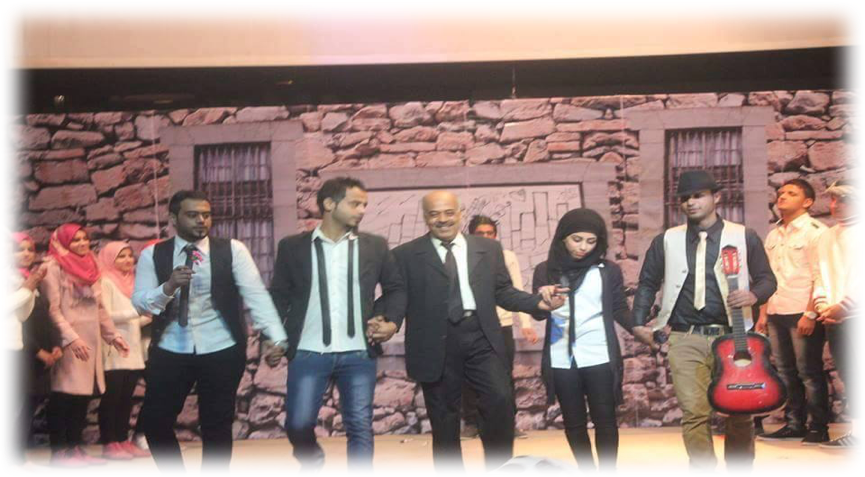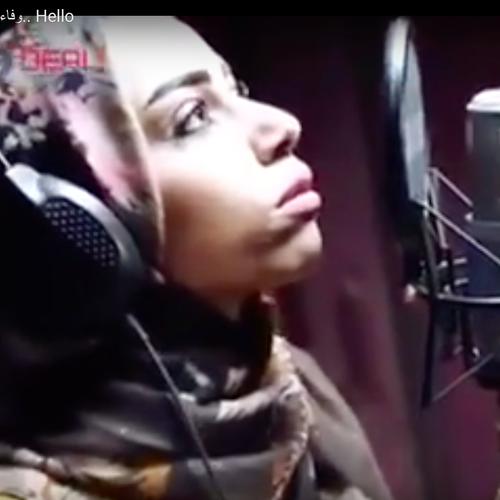When Wafaa Elnjaily, 24, sings, listeners often describe the sound as heavenly. One almost doesn’t want to exhale, for fear of breaking the spell: Wafaa's voice.
"My talent runs in my family's bloodline," explains Wafaa.
As luck would have it, her melodious voice comes from an oud player who has always been beside her; in fact, he brought her into this life: her father.
Wafaa has three brothers, two of whom also sing eloquently in English and Arabic and one who is a skilled drummer. Her mother is the only family member who has nothing to do with music, except to be a supporter.
"Music means a lot to me. It is my salvation, the medium through which I express myself the best—particularly when feeling ecstasy or grief,” Wafaa says. “In most cases, I tend to remain silent in public, too shy to speak. Music, though, brings me comfort. It summons my courage, making me feel self-possessed."
Unlike other Palestinian musicians, Wafaa normally does not sing about war, bloodshed, resistance, Israel and politics. Instead, she prefers to bring a smile to people’s faces, focusing on universal themes that touch all audiences—especially hope for a better tomorrow.
"My favorite musical instrument of all time is the acoustic guitar," she says with a wistful smile on her face. However, it costs 1,000 shekels (US$255)—beyond what she can afford.
In the conservative culture of Gaza, she has sometimes encountered people who devalue her gift because she is a female, suggesting the “kitchen” should be her home. But she never gives up. In fact, when she, her father and her three brothers sang in a concert in Gaza, she proved wrong those who underestimated her capabilities.

When Wafaa graduated from high school in the southern Gaza town of Rafah, she had a burning desire to be the most competitive singer she could. However, none of the schools in Gaza teach the principles of playing musical instruments and singing. She applied for lots of scholarships to study abroad, but to no avail. And thus, she went on to become a nurse instead. Still, her growing reputation did allow her to travel once to Italy, in 2006, and then to Cairo in 2012—both times to perform.
Due to the closure of the borders and a lack of financial resources, those trips are rare and she must rely on Facebook, YouTube and local TV to share her music.
"It makes me feel down sometimes," she says, dwelling on the cage that Gaza has become.
Then, one day, she received a call from an unrecognized phone number. Unexpectedly, it was the U.S. consulate general’s office in Jerusalem, which called to invite Wafaa to attend and sing at a Palestinian Women's Microenterprise Bazaar. It broke the shell of despair in which she had been encapsulated.
Thus, on November 17, 2015, she headed to the Erez checkpoint between Gaza and Israel, half anxious and half excited. Would she be allowed to pass or be rejected? Fortunately, she was allowed to cross, feeling relieved and euphoric.
She spent the night in the Al-Ambassador hotel, which is located on Nablus Road in the Sheikh Jarrah area of Jerusalem. The next day,
the bazaar opened around 9 a.m., when Wafaa stepped out to sing. At the event, many Palestinian women marketed their embroidery. In the evening, food prepared the Palestinian way by West Bank and Gazan women was served, under the supervision of Wafaa and some of her colleagues.
"Such a lovely experience it was," Wafaa sighs. "I got to know so many people for sympathized with our plight as Gazans, and I felt over the moon.”
Wafaa returned home on November 20. When she was checked in through Erez, "it felt like I was going back into a cage closed off from all sides. But you know what? My spirit is renewed once again after paying a visit to the city of Jerusalem, our capital."
Mentor: Pam Bailey
Posted February 23, 2016










